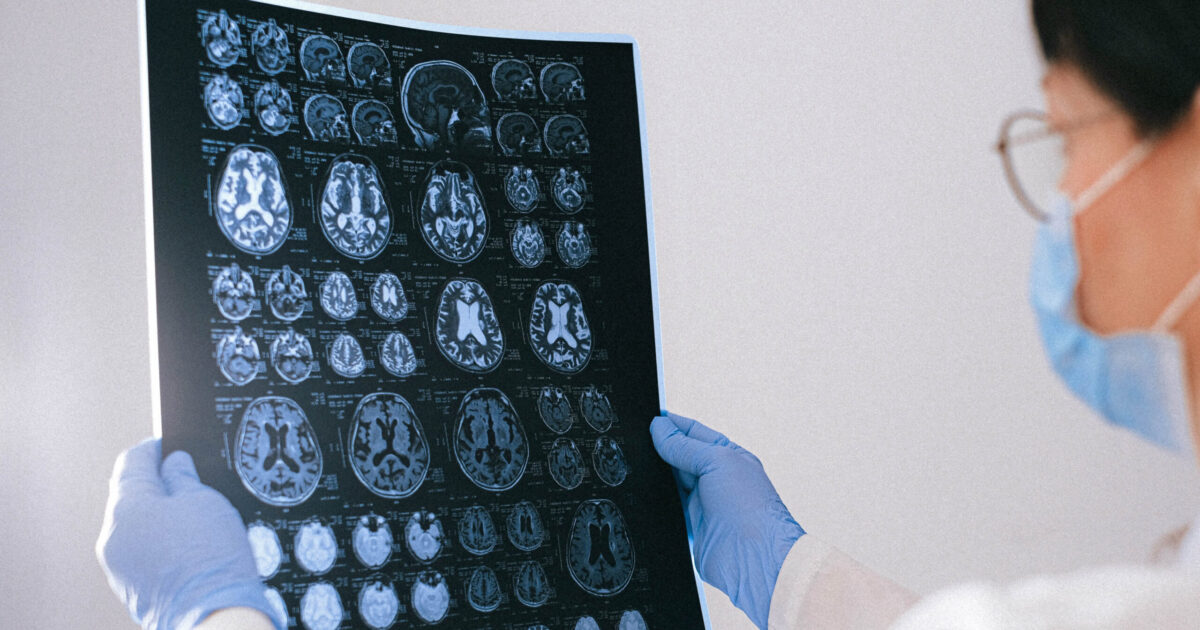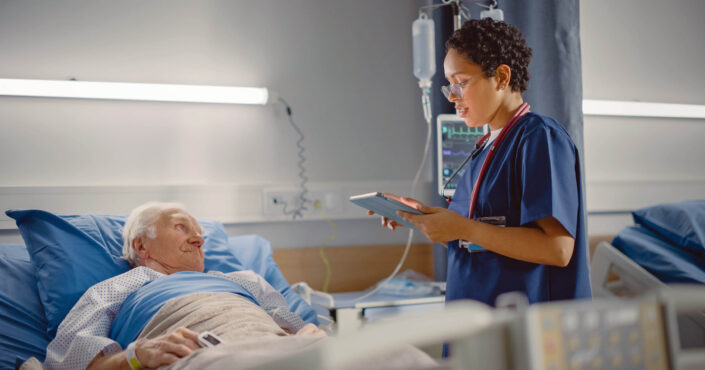Leveling up your RN skills can unlock exciting new career paths, especially with a specialty certification. Becoming a stroke certified registered nurse (RN) or certified neurology nurse is a specialized path that allows you to enhance your skills and impact patient outcomes in critical moments. You’ll be hands-on with patients with neurological conditions, providing essential care and ongoing support on their road to recovery.
Use this comprehensive guide to help you decide if this career path is the right fit and learn how to grow your career through certification.
What Is a Stroke or Neurology Nurse?
Stroke nurses and neurology nurses play critical roles in diagnosing, treating and rehabilitating patients who’ve experienced strokes or other neurological ailments. These specialized roles involve working closely with neurologists and other healthcare providers to improve patient outcomes, minimize long-term disabilities and educate patients and families on neurological conditions. While these roles are similar, they have slight differences:
- Neurology nurses play a vital role in caring for patients with neurological conditions and disorders. They work with patients affected by a wide range of issues, including stroke, epilepsy, Parkinson’s disease, multiple sclerosis (MS) and traumatic brain injuries.
- Stroke nurses are somewhat more specialized in caring for patients who’ve experienced a stroke. These RNs help assess, treat and manage stroke patients’ recovery while also educating patients and their families on steps that can help prevent future strokes.
A related job is the stroke coordinator RN. This specialist helps coordinate the entire care team and stroke care process, including patient diagnosis and rehabilitation.
Where Do Stroke and Neuro Nurses Work?

Stroke and neuro nurses work wherever patients with neurological conditions that demand a heightened level of specialized patient care exist. These settings include:
- Hospitals with stroke centers or certified Primary Stroke Centers (PSCs)
- Neuro ICUs and step-down units in specialized hospitals
- Emergency departments with rapid stroke response requirements
- Rehabilitation centers with support programs for patients regaining function post-stroke
- Outpatient clinics and telemedicine roles focused on stroke prevention, follow-up care and education
Key Stroke Nurse Certifications for Career Advancement
Given the critical and high-stakes nature of caring for patients with strokes or other neurological diagnoses, many employers require certification when hiring stroke and neuro nurses. Certification ensures that an RN has the specialized training and experience needed to excel in a neuro-focused environment. Earning one or more relevant certifications not only sets you apart from other applicants but also strengthens your candidacy for top-paying positions, including roles in large teaching hospitals.
The path to certification starts with gaining relevant clinical experience. For neuro and stroke nurse jobs, this experience can include working in critical care, emergency departments, neurology units or stroke centers. Many hospitals prefer stroke nurses with 1 to 3 years of acute care nursing experience. At least one year of neurological care experience is a prerequisite for applicable certifications.
Stroke Certified Registered Nurse (SCRN)
The American Board of Neuroscience Nursing (ABNN), accredited by the Accreditation Board of Specialty Nursing, offers SCRN certification. The ABNN’s SCRN Candidate Handbook states, “Certification in Stroke Nursing is the formal recognition of the attainment and demonstration of a unique body of knowledge necessary for the practice of Stroke Nursing.”
You need a minimum of 1 year of full-time experience (2,080 work hours) in some area of stroke care before you qualify for the certification exam. The exam consists of 170 multiple-choice questions. Passing the exam earns you 5 years of certification as a Stroke Certified Registered Nurse. You can recertify in the fifth year by either demonstrating you’ve taken 50 hours of continuing education (CE) or retaking the exam.
Certified Neuroscience Registered Nurse (CNRN)
This certification, also offered by ABNN, is somewhat broader than the SCRN credential, as it includes caring for patients with strokes, traumatic brain injuries, MS, Parkinson’s disease and spinal trauma. To be eligible, you need one year of full-time experience (2,080 work hours) in some area of neurological care.
The exam consists of 220 multiple-choice questions. Passing the exam earns you 5 years of CNRN certification. You can recertify by completing at least 2 years of full-time work (4,160 hours) in neurological care and retaking the exam or taking 75 hours of CE. Alternatively, you can complete 2,500 hours of neuroscience practice but must also complete 100 hours of CE relevant to the field.
National Institute of Health Stroke Scale Certification (NIHSS)
The American Heart Association offers NIHSS certification. This certification is available to many practitioners, including doctors, nurses, medical students and therapists. The relevant training helps you accurately and consistently evaluate the severity of a patient’s symptoms by measuring 15 areas affected by a stroke.
You can earn this certification in addition to either of the ABNN certifications. NIHSS certification focuses on demonstrating a unique and tangible skill, specifically around strokes, while the ABNN certifications more broadly cover standards of care.
To earn NIHSS certification, you must complete a 2-hour course and demonstrate proficiency in using the Stroke Scale by evaluating a series of test patients online. Successful completion grants certification for 1 year. To maintain certification, holders can assess additional panels of test patients every 2 years for renewal. NIHSS certification is highly valuable for any healthcare professional who may encounter stroke patients in their work.
Stroke and Neuro Nurse Responsibilities

Whether you are a stroke or neuro nurse, your responsibilities often overlap. Below are some common areas of involvement and key duties in patient care.
1. Acute Care and Monitoring
- Assessment of Neurological Function: Perform frequent neurological assessments using scales like the NIHSS to monitor the patient’s condition, detect changes and intervene quickly if necessary.
- Vital Signs Monitoring: Continuously monitor vital signs, especially blood pressure, heart rate and oxygen levels.
- Glasgow Coma Scale (GCS): Evaluate and document the patient’s level of consciousness and ability to respond.
- Seizure Precautions: Implement seizure precautions for at-risk patients, ensuring safety during seizure events.
2. Medication Administration
- Anticoagulant and Antiplatelet Therapy: Manage blood-thinning medications like heparin, warfarin or aspirin, and monitor the patient for side effects or complications.
- Pain and Symptom Management: Administer medications for pain, muscle spasticity and other neurological symptoms, ensuring comfort and safety.
3. Post-Acute Care and Rehabilitation
- Stroke Recovery Support: Assist with rehabilitation efforts, such as mobility exercises, speech therapy coordination and cognitive therapy.
- Patient and Family Education: Educate patients and families about stroke recovery, medication regimens, lifestyle modifications and signs of potential complications, like another stroke or infection.
- Assistive Devices: Help patients use assistive devices (e.g., walkers, communication tools) and teach them how to use them effectively.
4. Care Coordination
- Multidisciplinary Team Collaboration: Collaborate with neurologists, physical therapists, speech language pathologists and occupational therapists to ensure comprehensive care.
- Discharge Planning: Work with social workers and case managers to plan safe discharge and continued care at home, including home health services or rehabilitation programs.
5. Critical Thinking and Rapid Response
- Early Recognition of Complications: Be vigilant for signs of stroke complications, such as hemorrhagic transformation, increased intracranial pressure or recurrent stroke.
- Emergency Response: Respond to sudden neurological changes, activating stroke alerts or rapid response teams if the patient’s condition deteriorates.
6. Prevention and Education
- Stroke Prevention: Educate patients at high risk about making lifestyle changes (e.g., smoking cessation, diet and exercise) and managing chronic conditions like hypertension and diabetes to prevent future strokes.
- Preventing Aspiration Pneumonia: Ensure patients are positioned correctly for feeding, perform swallow evaluations and implement aspiration precautions.
7. Psychosocial Support
- Emotional Support: Provide emotional and psychological support to both the patient and their family, as stroke recovery can be a long and challenging process.
- Cognitive and Behavioral Changes: Monitor for post-stroke cognitive and emotional changes (e.g., depression, aphasia or memory loss) and communicate with the healthcare team to address these issues.
If you thrive in fast-paced environments, have an interest in neurology and patient education, and are prepared to support patients through challenging recoveries, a career in stroke or neurology nursing may be a great fit. This field offers significant growth opportunities, competitive salaries and the chance to make a meaningful impact on patients’ lives. However, it requires a commitment to continuous learning and can be emotionally demanding at times.
Demand and Salaries for Stroke and Neurology Nurses
Many neurological conditions, including stroke, Parkinson’s disease and MS, become more common as people age. Therefore, the aging of the U.S. population will likely increase the demand for neuro and stroke nurses in the coming years. Demand could grow the fastest in high-population states that are frequent destinations for retirees, including Florida, the Carolinas, Texas, New Mexico and Arizona.
As with many nursing specialties, being a neuro or stroke nurse pays well on average, but pay is particularly high in the best roles. As of the week of October 21, 2024, staff neurology nurse jobs posted on Vivian Health by staffing agencies and health systems nationwide paid an average salary of $41.22 an hour. Meanwhile, staff stroke nurse jobs paid an average salary of $42.58 per hour the same week. However, the highest paying jobs in these fields offered between $50 and $61 an hour. Shift differentials (for night shifts or weekends), bonuses and overtime can increase earnings further, while certification can help increase your base pay.
Elevate Your Career Through Certification
Grow your career and make a lasting impression with stroke nurse certification. With the knowledge you gain, you’ll enhance your professional qualifications and have the skills to improve the lives of those in critical need. Start your job search on Vivian Health and take your place at the forefront of neurological care today.









